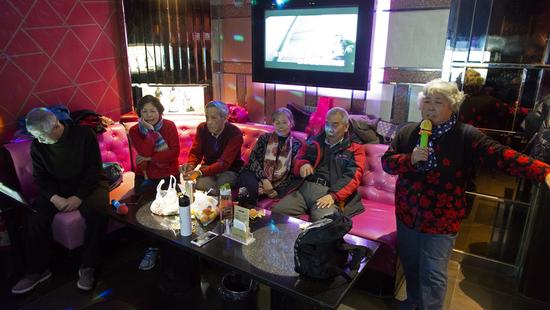
Huang Guizhen (1st right) and her friends in a karaoke room. (Photo/Xinhua)
Once the first choice of entertainment for the nation's youth, KTV bars are now becoming the favored hangout for China's elderly.
Huang Guizhen, 70, jumps on a bus on a bright cold morning, heading toward Milo KTV in Chongwenmen, near Tian'anmen Square.
It is one of over 2,000 karaoke venues in Beijing, which are slowly replacing parks as the most popular place for China's elderly to party.
As the KTV opens at 10 a.m., hundreds of senior citizens rush to bag the best rooms. Many have even booked in advance. Carrying thermal flasks and bags of fruit and snacks, they will stay in the windowless rooms for the next eight hours, singing, snacking and having a good gossip.
Huang is tired after the three-hour bus trip, but relaxes as soon as she sets eyes on her old friends -- six former colleagues, the oldest aged 76.
As lyrics stream across the TV screen, she belts out a few of her favorite pop-tunes -- first a number by well-known singer Dao Lang, then one by Taiwanese hearthrob Jay Chou.
Her audience sit on a sofa, laughing, cheering, and wolfing down peanuts like there is no tomorrow.
"It's just a bit of fun," Huang says.
China has an aging population. The number of people over 60 reached 16.7 percent of the population at the end of 2016, and by 2030 this will hit about 25 percent.
In order to get the elderly out more and improve their quality of life, the China Culture & Entertainment Industry Association teamed up with the Chinese entertainment industry to launch a program called "Sunshine Entertainment, Sunset Glow."
More than 200 entertainment firms in 23 provincial regions joined the program, which offers free or discounted recreational activities such as daytime karaoke to people over 50, benefiting millions of seniors.
The program has made karaoke affordable for the elderly. A room for 10, with free coffee and water, costs less than 100 yuan (15 U.S. dollars) during the day at the Milo KTV branch in Chongwenmen.
Sun Yiqing, 71, is one of Huang's friends, meeting her in the 1960s when they volunteered at an auto factory on a remote mountain in Shaanxi Province.
"When people grow old, they enjoy spending intimate time with old friends. We have visited nearly all the parks in Beijing. We need more recreational choices," says Sun, a Beijinger.
Li Mingrui, manager of the KTV venue, says the emergence of karaoke as an entertainment for the elderly offers a great pastime for China's aging society and a great solution for China's declining KTV industry.
"It's a win-win situation ... as gray-haired consumers can help the popularity of a declining karaoke industry," says Li, whose KTV joined the program in late July.
Karaoke has flourished in nearly every town and city on the Chinese mainland since it was imported from Japan in the 1990s.
"The years from 2004 to 2008 were the golden period for KTVs on the Chinese mainland. They were a popular hangout for young people," Li says.
In the boom years, his KTV could receive more than 1,000 visitors a day. There was always a long queue outside, and they even needed police officers to beef-up security on Christmas eve.
But as young people have embraced the Internet and with the emergence of new novelties such as mini karaoke booths and mobile singing apps, the microphones in many traditional karaoke venues have fallen silent.
It is now the older generation's turn to sing. To meet demand, Li opens the venue half an hour earlier and allows the seniors to bring their own food, something that was banned in the past.
"When we were young, we did not have time to play due to work and family," Huang says. "We had grandchildren to look after, even after retirement. When they grew up we finally had time, but we had turned old."
"We should live everyday as if it were our last," says Li Linshan, 67. "I will not help my daughter look after her second child who has just been born. I have my own life."
Li's friends call him the "prince of the love song," though he has other hobbies, such as photography and sketching. He recently spent 300 yuan on microphone, headset and sound card, so he can practice singing on a live stream platform at home, deep into the night.
The music is over at 6 p.m. Huang grabs her purple down-jacket, says goodbye to her friends and rushes home to prepare dinner for her husband. But she is already looking forward to the next party.
"I'm not a good singer, but it doesn't matter," she says. "Singing makes me feel like I'm still young."


















































